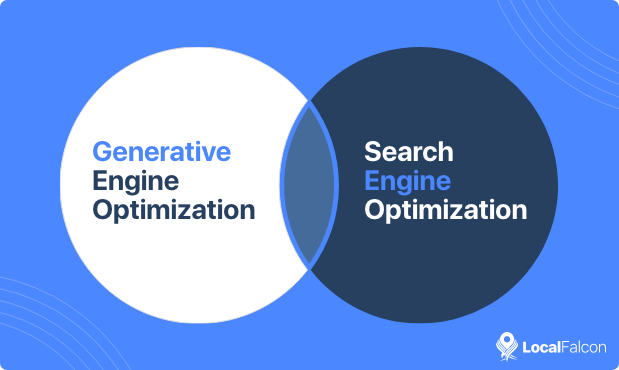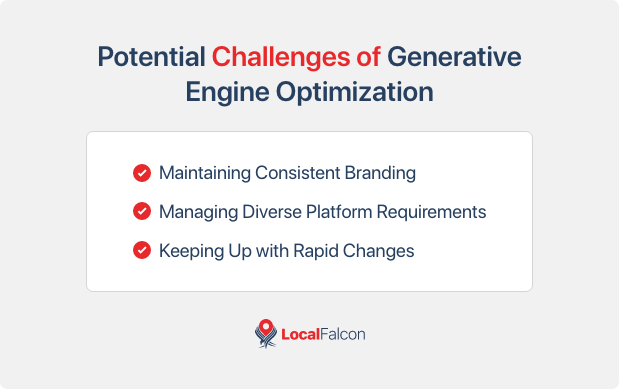SEO has been experiencing dramatic changes as of late. So much so that there's even a "new SEO" being talked about: generative engine optimization (GEO).
While traditional search engine optimization remains important, the proliferation of AI-driven tools, including generative AI platforms, AI-infused SERPs, copilots, and voice assistants, has shifted the focus away from optimizing strictly for search engines (and let's face it; when we say search engines, what we really mean is Google).
Although Google will undoubtedly still be central to SEO strategies, especially local SEO strategies, moving forward, the concept of generative engine optimization means that businesses must optimize for visibility wherever their audience interacts online; and that means optimizing for AI-powered tools.

What Is Generative Engine Optimization?
Generative engine optimization broadens the scope of SEO to include a variety of platforms, reflecting the diversity of today's online behaviors and digital ecosystems.
Unlike traditional SEO, which emphasizes optimizing for Google's algorithms, GEO addresses the need for businesses to perform well across multiple digital channels, recognizing that modern users don't always go straight to Google to find what they're looking for.
This approach includes optimizing for discovery on GenAI tools, AI-driven SERPs, copilots, and even voice-activated assistants like Alexa or Siri. In this sense, modern search is not limited to typed queries, but rather it encompasses traditional text, voice, and even visual searches.

Generative Engine Optimization Vs Search Engine Optimization
The key difference between traditional search engine optimization and generative engine optimization lies in their goals.
While both approaches aim to increase a business's visibility, traditional SEO focuses primarily on ranking well on Google, with a focus on keywords, backlinks, and technical site improvements. In local SEO, this also means optimizing Google Business Profiles to try and earn a spot in Google's local pack.
On the other hand, GEO recognizes that users discover content through many pathways, not just traditional search engines. Success in this approach requires tailoring strategies to fit platform-specific algorithms and user behaviors.
Is Generative Engine Optimization Really the New SEO?
The claim that generative engine optimization is the "new SEO" stems from its expanded focus on optimizing for visibility across various AI-driven digital platforms, rather than just search engines, to align with contemporary user behaviors and digital marketing trends.
But, while GEO complements (and even includes) traditional SEO, it's not necessarily replacing it. Instead, generative engine optimization acknowledges shifts in user behavior and the need for businesses to diversify their digital strategies according to how their target audience interacts online.
As AI-based platforms, including GenAI platforms, copilots, and voice assistants, become increasingly more critical to online discovery, marketers must adapt their optimization strategies for a range of relevant ecosystems while maintaining strong foundations in traditional search engine optimization.
In short, traditional SEO isn't going anywhere; it's now an important part of a generative engine optimization strategy that maximizes online visibility and engagement.
Generative Engine Optimization and Local SEO
Generative engine optimization will significantly impact local SEO by broadening the range of platforms and touchpoints businesses must optimize for to reach and engage local audiences.
Beyond optimizing Google Business Profiles to improve rankings within Google Search and Google Maps results, local businesses must ensure they're optimizing for alternative directories, review sites, navigation, and social platforms, as well as for voice searches, and, most importantly, AI-driven search results.
This holistic approach ensures visibility wherever local customers search, whether they're asking a voice assistant for recommendations or reading AI overviews instead of clicking through traditional search and map pack results.
Although generative AI-powered search experiences, including Google's AI overviews and Bing's generative search experience, are still very much in their experimental stages and prone to rapid change, it's important for local SEOs to stay on top of how they evolve and affect how local search results are displayed to users.
As new ranking factors and opportunities for visibility emerge, incorporating new optimization strategies tailored to AI preferences will be key to successful local GEO.
How a Restaurant Might Implement Local Generative Engine Optimization: A Hypothetical Case Study
Let's take a local Italian restaurant as an example and look at how the business might expand their local SEO strategy and start implementing generative engine optimization:
- Google Business Profile: GBP is still the most important asset for local SEO, so the restaurant makes sure to keep its profile updated with accurate information, high-quality photos, and regular posts about specials or events, ensuring it appears in Google's local pack and Google Maps results and providing lots of data for AI models to pull from.
- Yelp and Tripadvisor: In addition to gathering reviews on Google, the business also encourages satisfied customers to leave reviews on Yelp and Tripadvisor and responds to feedback promptly, fostering trust and boosting visibility while increasing its chances of showing up in AI-generated local search results, which often pull info from various high-authority directories.
- Business Website: The restaurant maintains an easy-to-navigate website with online reservations, menus, and optimized content that ranks well for relevant search queries with local intent.
- Content with AI Overviews in Mind: By crafting high-quality, factually accurate content, the restaurant positions itself to be highlighted in generative AI overviews on platforms like Google and Bing.
- PR & Guest Posting: The restaurant contributes guest posts to local food blogs and secures press mentions in industry-relevant sites that AI models reference, increasing its chances of appearing in AI-generated search results.

Potential Challenges of Generative Engine Optimization
Adopting generative engine optimization isn't without its challenges. It's important for businesses to understand and address potential challenges to successfully implement a new SEO approach that goes beyond traditional search engine optimization.
Maintaining Consistent Branding
With content spread across multiple platforms, ensuring consistent messaging, visuals, and tone can be difficult. To address this, businesses should create robust brand guidelines and centralized content strategies to avoid fragmented or confusing messaging, while still adapting to the unique style and user preferences of each specific platform.
Managing Diverse Platform Requirements
Each platform has unique algorithms, formats, and best practices. Tailoring content to meet these demands while maintaining efficiency can strain resources. Using automation tools and working with specialists for specific platforms can help streamline efforts.
Keeping Up with Rapid Changes
Algorithms and user preferences evolve quickly, making it vital for businesses to stay informed by paying attention to industry updates, monitoring performance trends across platforms, and experimenting with emerging trends to stay competitive.
Key Takeaways
Rather than looking at generative engine optimization as the new SEO, think of it as an evolution of SEO in response to changes in user behavior and technological advancements, with traditional search engine optimization still playing a very important role.
With user preferences in a state of constant flux and the ongoing integration of AI technology into everyday online interactions, now is the time for businesses, including local businesses, to start expanding their optimization strategies across platforms to boost visibility and engagement.
Ultimately, building on top of traditional SEO strategies with GEO practices will help businesses reach a broader audience and set themselves up for sustainable long-term success!


